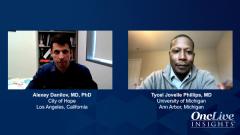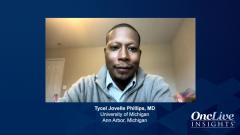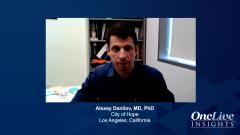
Novel Agents and Ongoing Trials in R/R Follicular Lymphoma
Dr Tycel Jovelle Phillips reviews key ongoing trials in relapsed/refractory follicular lymphoma.
Episodes in this series

Alexey Danilov, MD, PhD: Dr Phillips, do you want to highlight the ongoing trials in relapsed/refractory follicular lymphoma?
Tycel Jovelle Phillips, MD: Yes, there are a few exciting phase 3 studies that are in the process. Since you mentioned tazemetostat, there is an ongoing phase 3 study looking at tazemetostat plus R²[rituximab and lenalidomide] versus R² in patients who have been exposed to 1 or more prior lines of therapy. Based on the epigenetic mechanism of action that tazemetostat is thought to have, even in those without an EZH2 mutation, there’s some merit to see if that can add to the benefit of R², using R² very similarly to what was done on AUGMENT. Because of the safety profile of tazemetostat, if there’s any sort of clinical synergy between the agents, that could potentially allow that to move up into a second-line setting to be given in combination with R² and open up the spectrum of patients who can be treated with this agent, versus what we discussed before where it’s mostly beneficial for the patients with EZH2 mutations. There are also several studies being evaluated adding other agents to R², such as some of the bispecific antibodies, which we haven’t touched on yet. But again, whether these agents can improve upon some of the data we see with R² would be something worthwhile to look forward to.
Then there are several delta inhibitors such as zandelisib, which is a very specific delta inhibitor, but they have a phase 3 COASTAL study that’s looking at rituximab plus zandelisib versus investigator’s choice, comparing it to R [rituximab], chemoimmunotherapy in those who have failed more than 1 prior line of therapy. There are also some other smaller studies looking at copanlisib in combination with other agents in some of these indolent non-Hodgkin lymphomas including follicular lymphoma. There are some agents looking at some of the other delta inhibitors, such as parsaclisib in combination with some of these other more novel treatments such as tafasitamab in patients with indolent non-Hodgkin lymphoma. There will always be interesting studies. The phase 3 studies will be more impactful if they show a beneficial response because of the crowded nature of the few that we have. How those things play out and even how some of the single-agent bispecific studies play out will probably be a big boon for us as far as options for our patient. But it also probably will make it more difficult to figure out how to structure how you treat these patients and will set up a hierarchy of which agents to use before some of the other ones. But the more options we have, the better for our patients. I’d be quite excited to see how some of these studies read out over the next several years.
Alexey Danilov, MD, PhD: In addition to that, let me highlight another aspect. We always talk about POD24 [progression of disease within 24 months], or aggressive disease within 24 months of diagnosis or even first-line therapy for follicular lymphoma. Those tend to be patients who have an unmet medical need, patients who progress quickly after the initial diagnosis followed by chemotherapy. They have an overall survival of 50% at 5 years as opposed to 90% for everyone else. And there we actually have a cooperative group study, SWOG 1608, where such patients are picked up early and administered targeted therapies based on arm assignment, whether that’s umbralisib, lenalidomide. I would highlight that study as one that specifically addresses this high-risk patient population. And I agree with you. We have a plethora of really exciting, targeted therapies now.
We also have bispecifics, which you have mentioned, which have very high response rates in follicular lymphoma. How we will ultimately fit the bispecific antibody therapy into follicular lymphoma, that also will be interesting, and many of those agents are pretty well tolerated. And then finally we do have CAR [chimeric antigen receptor] T-cell therapy, and while patients who progress post CAR T-cell therapy remain an unmet challenge, maybe if we start using CAR T-cell therapy earlier in the course of disease we will have even better results, more durable results with CAR T cells. At this point, the follow-up on the ZUMA-5 study and similar studies is still short, so we don’t know the long-term efficacy, but it still is an exciting approach and is bringing a lot of promise. Lots of exciting stuff happening.
Transcript Edited for Clarity









































